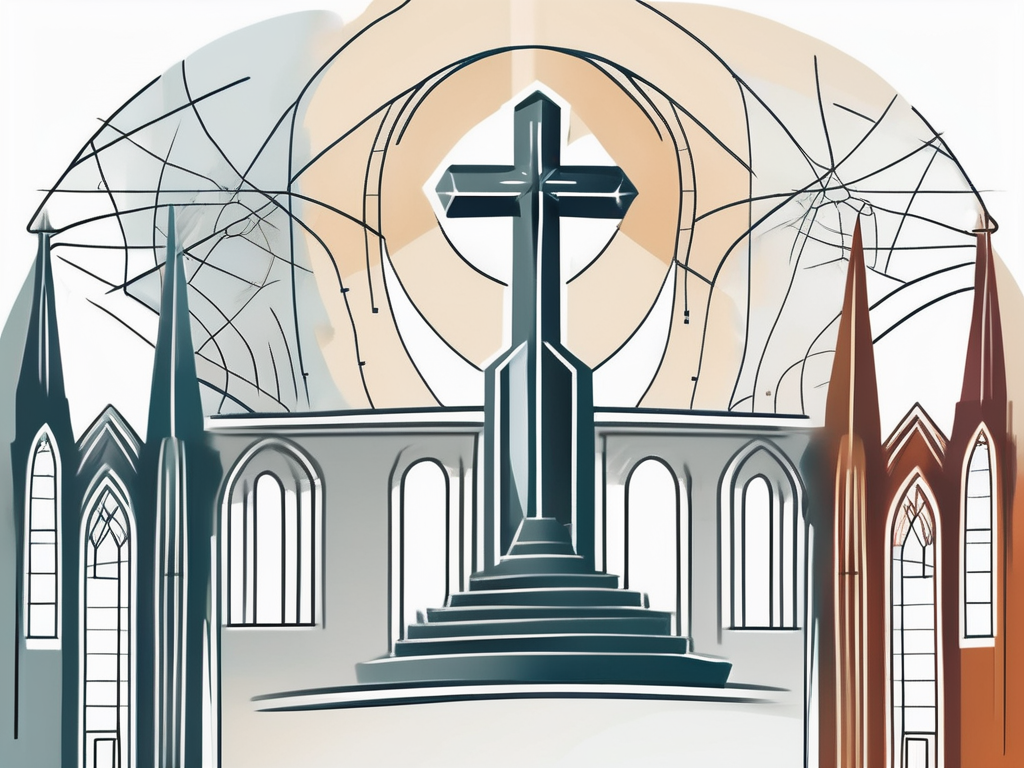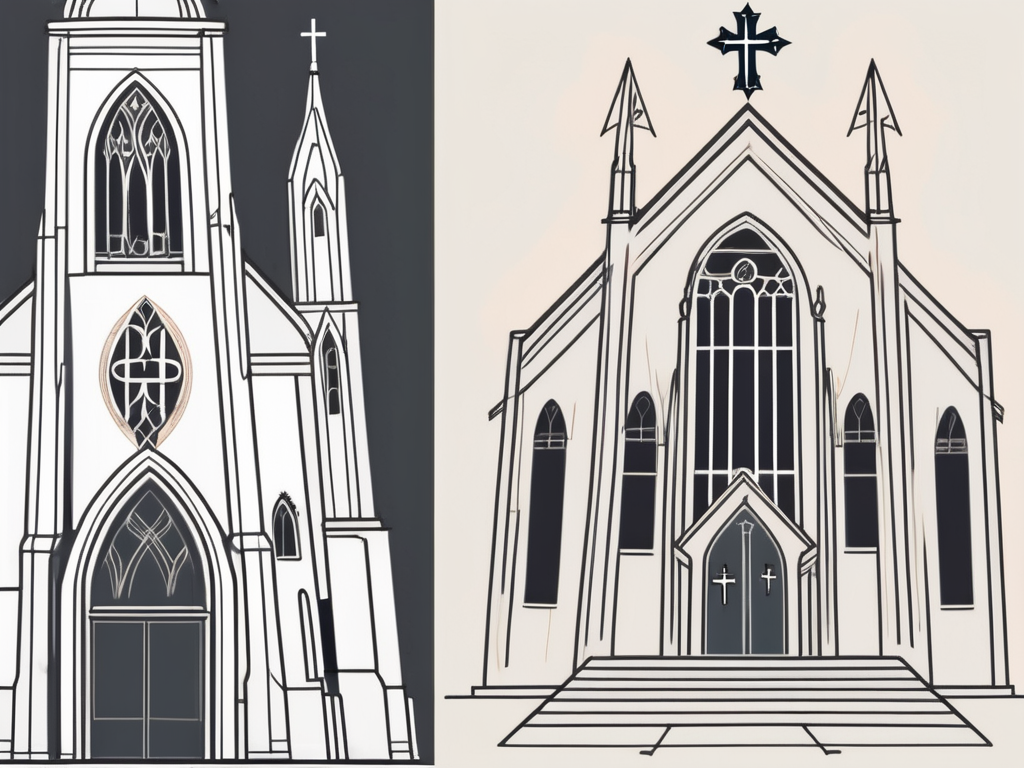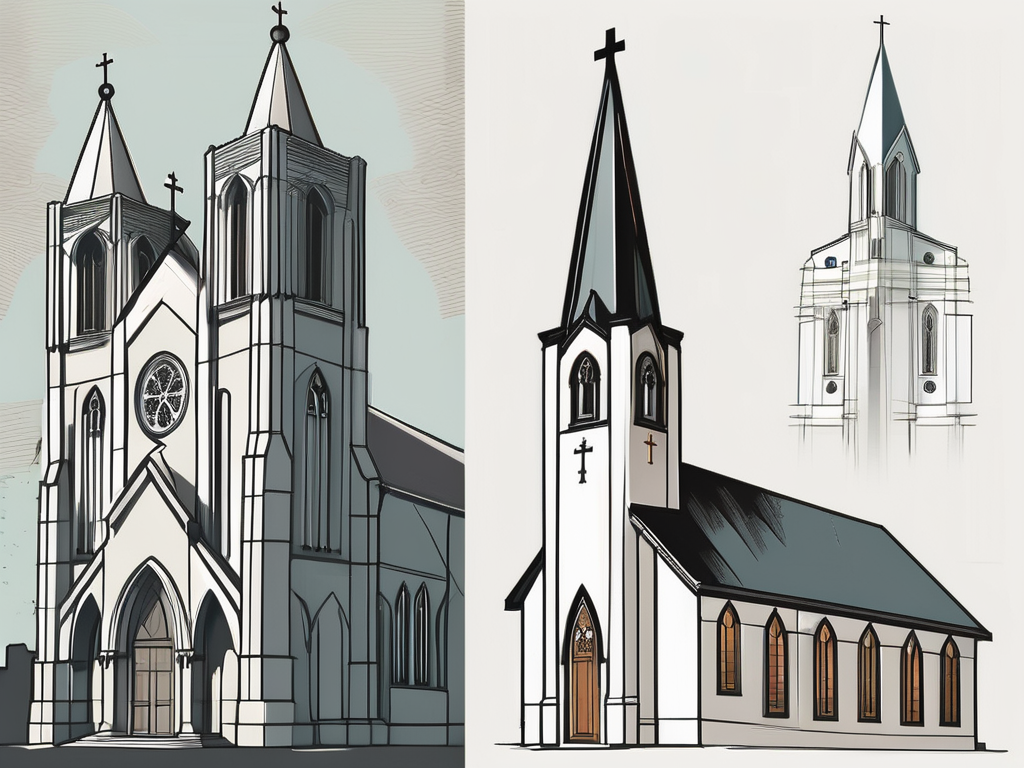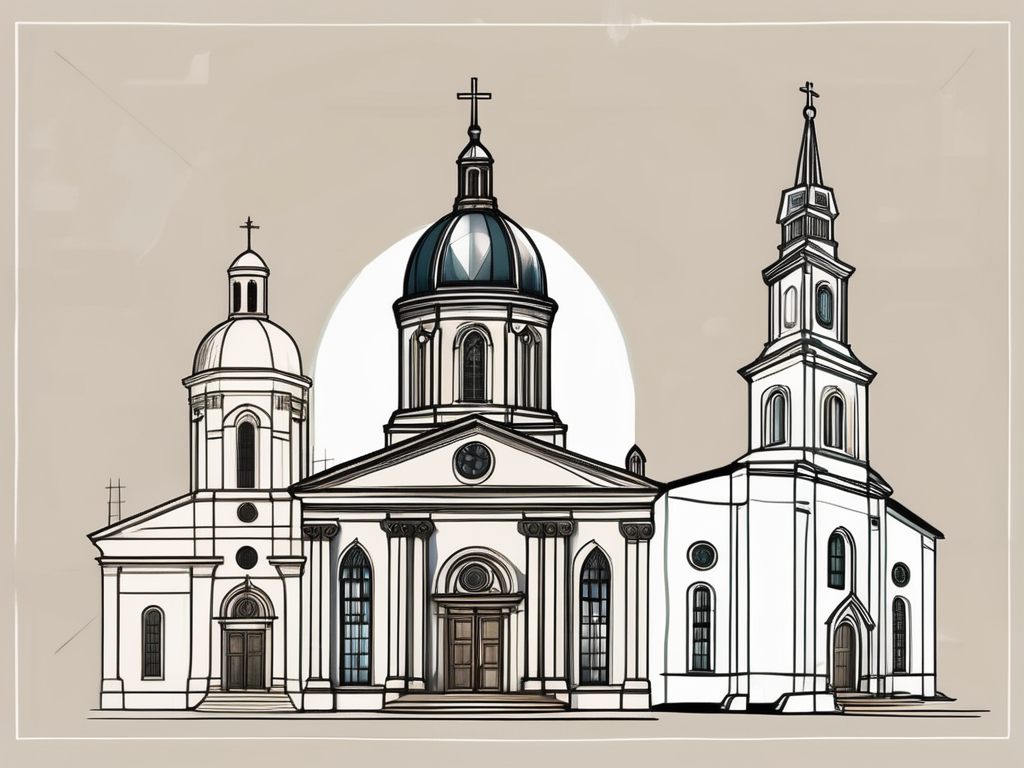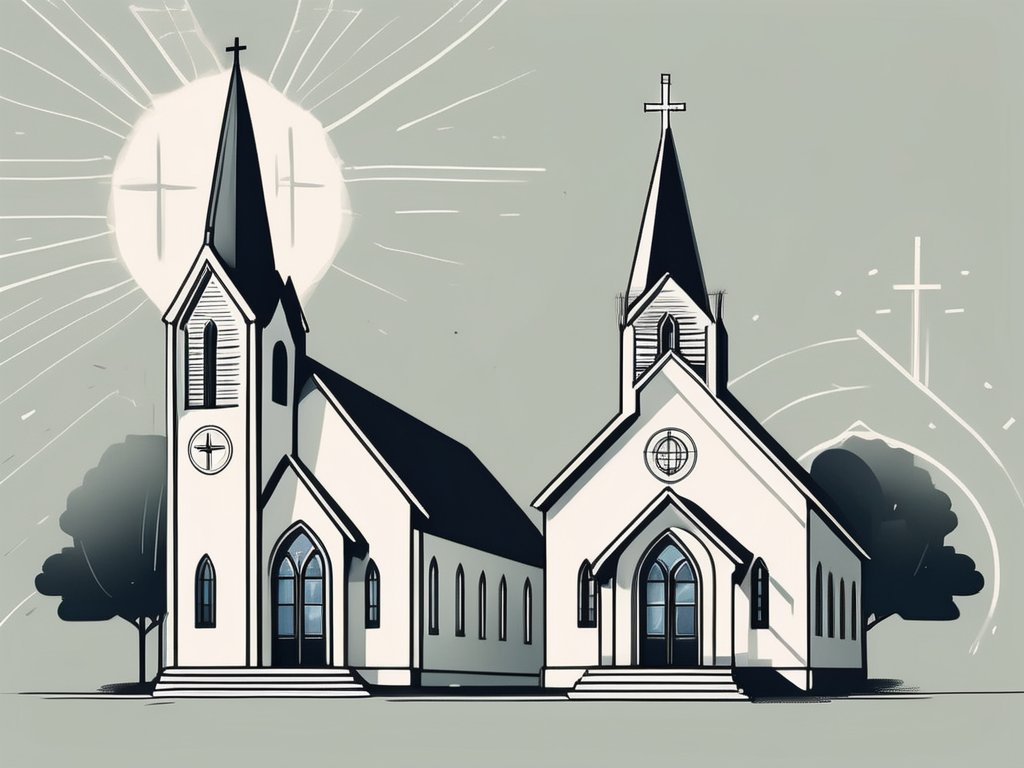In the realm of Christianity, there is a diverse range of denominations with unique beliefs and practices. Two prominent branches are Methodist and Presbyterian, each with its rich history and distinctive characteristics. In this article, we will dive deep into their origins, core beliefs, worship styles, church governance, and the roles of clergy and laity.
Understanding the Origins of Methodism and Presbyterianism
The Birth of Methodism
Methodism traces its roots back to 18th-century England, where it emerged as a response to the widespread spiritual dissatisfaction and moral decay of the time. The movement was championed by John Wesley, an Anglican priest whose passion for spiritual renewal led him to form societies conducive to personal spiritual growth and accountability.
Wesley’s theological foundation rested on the concept of “practical divinity,” emphasizing the necessity of a personal relationship with Jesus Christ and the importance of good works as a natural outpouring of faith.
As Methodism gained momentum, it spread beyond England and made its way to the American colonies. The Methodist movement found fertile ground in the New World, where it resonated with the religious fervor of the Great Awakening. The Methodist Episcopal Church was established in the United States in 1784, marking the formal organization of Methodism as a distinct denomination.
Throughout its history, Methodism has been known for its emphasis on social justice and the pursuit of holiness. Methodists have been at the forefront of various social reform movements, including the abolition of slavery, women’s suffrage, and civil rights. Today, Methodism continues to thrive as a global movement, with millions of adherents around the world.
The Emergence of Presbyterianism
Presbyterianism, on the other hand, originated in Scotland during the 16th century amidst the Protestant Reformation. It finds its roots in the teachings of John Knox, a disciple of John Calvin.
Knox, a fiery preacher and theologian, played a pivotal role in shaping the religious landscape of Scotland. He advocated for a reformed church that adhered to the principles of Calvinism, which emphasized the sovereignty of God and the authority of Scripture.
Presbyterianism takes its name from its form of church governance. The Presbyterian approach emphasizes the idea that the Church should be governed by a series of interdependent courts, known as presbyteries, where elders (presbyters) hold decision-making power. This system of governance ensures that no single individual or group has absolute authority, promoting a balanced and accountable leadership structure.
Throughout history, Presbyterianism has been characterized by its commitment to education and intellectual rigor. Presbyterian churches have established numerous educational institutions, including colleges and seminaries, to cultivate a well-informed clergy and laity.
Presbyterianism has also played a significant role in the development of democracy and civil liberties. Many of the principles espoused by Presbyterian theologians, such as the separation of powers and the protection of individual rights, have influenced the formation of democratic governments around the world.
Today, Presbyterianism is a diverse and global movement, with various branches and denominations. While each branch may have its distinct practices and traditions, they all share a common commitment to the Reformed faith and the principles of Presbyterian governance.
Core Beliefs and Doctrines
When it comes to matters of faith, different Christian denominations have their own distinct beliefs and doctrines. In this discussion, we will explore the fundamental beliefs of Methodism and the key doctrines of Presbyterianism.
Fundamental Beliefs of Methodism
Methodists hold a set of core beliefs that shape their understanding of God, salvation, and the Christian life. At the heart of Methodist theology is a belief in the Triune God – the Father, Son, and Holy Spirit. Methodists affirm the divinity of Jesus Christ, recognizing Him as the Son of God who came to earth to save humanity from sin.
Central to Methodist teachings is the concept of salvation by grace through faith. Methodists believe that salvation is a gift from God, freely given to all who believe in Jesus Christ. It is not something that can be earned or achieved through human effort alone. Instead, it is received by placing one’s faith in Jesus and accepting His sacrifice on the cross.
Another key belief in Methodism is the idea of sanctification. Methodists understand sanctification as an ongoing process of becoming more like Christ. It involves the transformation of one’s heart, mind, and actions, as the Holy Spirit works within the believer to bring about spiritual growth and maturity.
In addition to these core beliefs, Methodists view the sacraments of baptism and Communion as essential rituals that hold deep spiritual significance. Baptism is seen as a symbolic act of initiation into the Christian faith, signifying a person’s identification with Christ’s death, burial, and resurrection. Communion, also known as the Eucharist or the Lord’s Supper, is a sacred meal that commemorates Jesus’ last supper with His disciples and serves as a means of experiencing His presence and grace.
Key Doctrines of Presbyterianism
Presbyterians, on the other hand, have their own set of key doctrines that shape their understanding of God, salvation, and the Christian life. At the core of Presbyterian theology is an emphasis on the sovereignty of God. Presbyterians believe that God is in control of all aspects of life and faith, and that His will is ultimately accomplished.
Presbyterians hold to the belief that humanity is fallen and in need of salvation. They affirm that salvation is found only through Jesus Christ, who lived a sinless life, died on the cross for the forgiveness of sins, and rose again from the dead. The authority of the Bible is highly regarded in Presbyterianism, as it is seen as the inspired Word of God and the ultimate source of truth and guidance.
One distinctive doctrine of Presbyterianism is the belief in predestination. This doctrine suggests that God, in His sovereignty, has predestined certain individuals for salvation. It emphasizes the idea that salvation is not based on human merit or effort, but on God’s gracious choice. However, Presbyterians also emphasize the importance of personal faith and reliance on God’s grace, understanding that faith is the means by which individuals receive and respond to God’s saving work.
Presbyterians, like Methodists, also practice the sacraments of baptism and Communion. Baptism is seen as a sign and seal of God’s covenant, symbolizing the believer’s union with Christ and participation in His death and resurrection. Communion is viewed as a sacred act of remembrance and communion with Christ, as well as a means of spiritual nourishment and renewal.
These are just a few of the core beliefs and key doctrines that shape the theology of Methodism and Presbyterianism. While there are differences between these two denominations, they both share a commitment to following Christ and seeking to live out their faith in the world.
Worship Styles and Practices
Worship in Methodist Tradition
Methodist worship services typically incorporate a blend of traditional and contemporary elements. These may include hymns, contemporary worship songs, Scripture readings, prayers, and sermons.
Methodists value both the intellectual and emotional aspects of worship, seeking to engage the mind and the heart. This is often reflected in the structure of their services, which aim to offer a balanced mix of teaching, prayer, and musical expressions of praise.
One unique aspect of Methodist worship is the emphasis on Wesleyan theology. John Wesley, the founder of Methodism, believed in the importance of personal holiness and the pursuit of a deeper relationship with God. This theological perspective is often woven into the sermons and teachings during Methodist worship services, encouraging believers to grow in their faith and live out their beliefs in their daily lives.
In addition to the regular Sunday services, Methodists also have special worship practices and traditions. One example is the observance of Holy Communion, also known as the Eucharist or the Lord’s Supper. This sacrament is seen as a means of grace, where believers partake in the bread and wine as a way to remember and participate in the sacrifice of Jesus Christ.
Methodist worship services also often include opportunities for personal prayer and reflection. This may be through designated times of silent prayer, altar calls, or the use of prayer stations where individuals can engage in focused prayer and meditation.
Worship in Presbyterian Tradition
Presbyterian worship services are characterized by a more formal and structured approach. Liturgical elements, such as prayers, responsive readings, and creeds, play an integral part in their worship experiences.
Music also holds a significant place in Presbyterian worship, often featuring traditional hymns sung by the congregation and choral arrangements performed by choirs. The use of musical instruments, such as the organ or piano, adds to the richness of the worship experience.
The sermon also takes center stage in Presbyterian worship, providing a time for biblical teaching and reflection. Presbyterian pastors are often well-trained in theology and deliver thoughtful and engaging sermons that challenge and inspire the congregation.
Presbyterian worship services also emphasize the importance of community and corporate worship. The congregation is encouraged to actively participate in the service, whether through responsive readings, reciting creeds, or joining in communal prayers.
Another distinctive aspect of Presbyterian worship is the practice of infant baptism. Presbyterians believe in the covenantal nature of baptism, where infants are welcomed into the community of faith and receive God’s grace. This sacrament is seen as a sign of God’s love and a commitment to raise the child in the knowledge and love of Christ.
Presbyterian worship services often follow a liturgical calendar, which includes special seasons such as Advent, Lent, and Easter. These seasons provide opportunities for focused reflection and celebration, as the congregation journeys through the life of Christ and the story of salvation.
Overall, both Methodist and Presbyterian worship traditions offer unique and meaningful experiences for believers. Whether through a blend of traditional and contemporary elements or a more formal and structured approach, these worship styles provide opportunities for individuals to connect with God, grow in their faith, and experience the richness of Christian community.
Church Governance and Structure
The Methodist Polity
In Methodism, local churches are connected through a system known as connectionalism, where congregations are organized into conferences and overseen by bishops. These bishops provide spiritual leadership and guidance to the pastors serving in their respective conferences.
Within the Methodist polity, decision-making power is shared among both clergy and lay members. Each conference has appointed committees responsible for various aspects of church administration, such as missions, finances, and social justice. These committees play a vital role in shaping the direction and priorities of the Methodist Church.
One of the unique features of the Methodist polity is the itinerant system, where pastors are appointed to serve in specific churches for a limited period of time. This system allows for a rotation of pastoral leadership, ensuring that different congregations benefit from the diverse experiences and perspectives of various pastors.
Furthermore, the Methodist Church places a strong emphasis on the connection between faith and social justice. Through their committees and conferences, Methodist churches actively engage in advocacy and outreach programs, addressing issues such as poverty, inequality, and discrimination.
The Presbyterian Polity
Presbyterian churches operate under a system of representative government, wherein leaders are chosen by the congregation to form various governing bodies at local, regional, and national levels. These governing bodies, known as sessions, presbyteries, and synods, provide decision-making authority and ensure accountability and unity within the Presbyterian Church.
Elders, who may be ordained pastors or lay members, serve as leaders within Presbyterian churches. They participate in the administration of sacraments, teaching, and shepherding the congregation. The role of elders is essential in maintaining the spiritual well-being of the church and fostering a sense of community among the members.
Presbyterian polity emphasizes the importance of communal discernment and consensus-building. Major decisions within the church are made through a process of deliberation and voting, ensuring that the voices of all members are heard and respected.
Another significant aspect of the Presbyterian polity is the principle of connectionalism. Presbyterian churches are connected through regional and national governing bodies, which facilitate cooperation, resource-sharing, and mutual support among congregations. This connectional structure enables the Presbyterian Church to have a broader impact and influence beyond individual local churches.
Overall, both the Methodist and Presbyterian polities provide a framework for effective governance and structure within their respective churches. While they may differ in certain aspects, both systems prioritize the involvement of clergy and lay members in decision-making processes, ensuring a sense of ownership and shared responsibility among the church community.
Role of Clergy and Laity
Clergy and Laity in Methodism
In Methodism, the distinction between clergy and laity is not seen as hierarchical but rather reflects different roles and responsibilities within the Church. Ordained clergy, such as pastors and deacons, are designated to lead worship services, officiate sacraments, and provide spiritual guidance to the congregation.
Lay members, on the other hand, actively participate in the ministries of the Church, serving in various leadership positions and contributing to the overall mission and outreach efforts.
Clergy and Laity in Presbyterianism
Presbyterianism encourages the active participation of both clergy and laity in the life of the Church. While ordained ministers are responsible for preaching, teaching, and administering sacraments, they work alongside the laity to govern and empower the congregation.
Within the Presbyterian structure, all believers are viewed as ministers, regardless of ordination status. Therefore, the laity plays a vital role in carrying out the work of the Church through service, discipleship, and evangelism.
While both Methodist and Presbyterian traditions are rooted in the Christian faith, they exhibit unique characteristics that shape their beliefs, worship practices, governance, and the involvement of clergy and laity. Understanding these differences allows us to appreciate the diversity within Christianity and foster greater unity in our shared pursuit of God’s kingdom.



